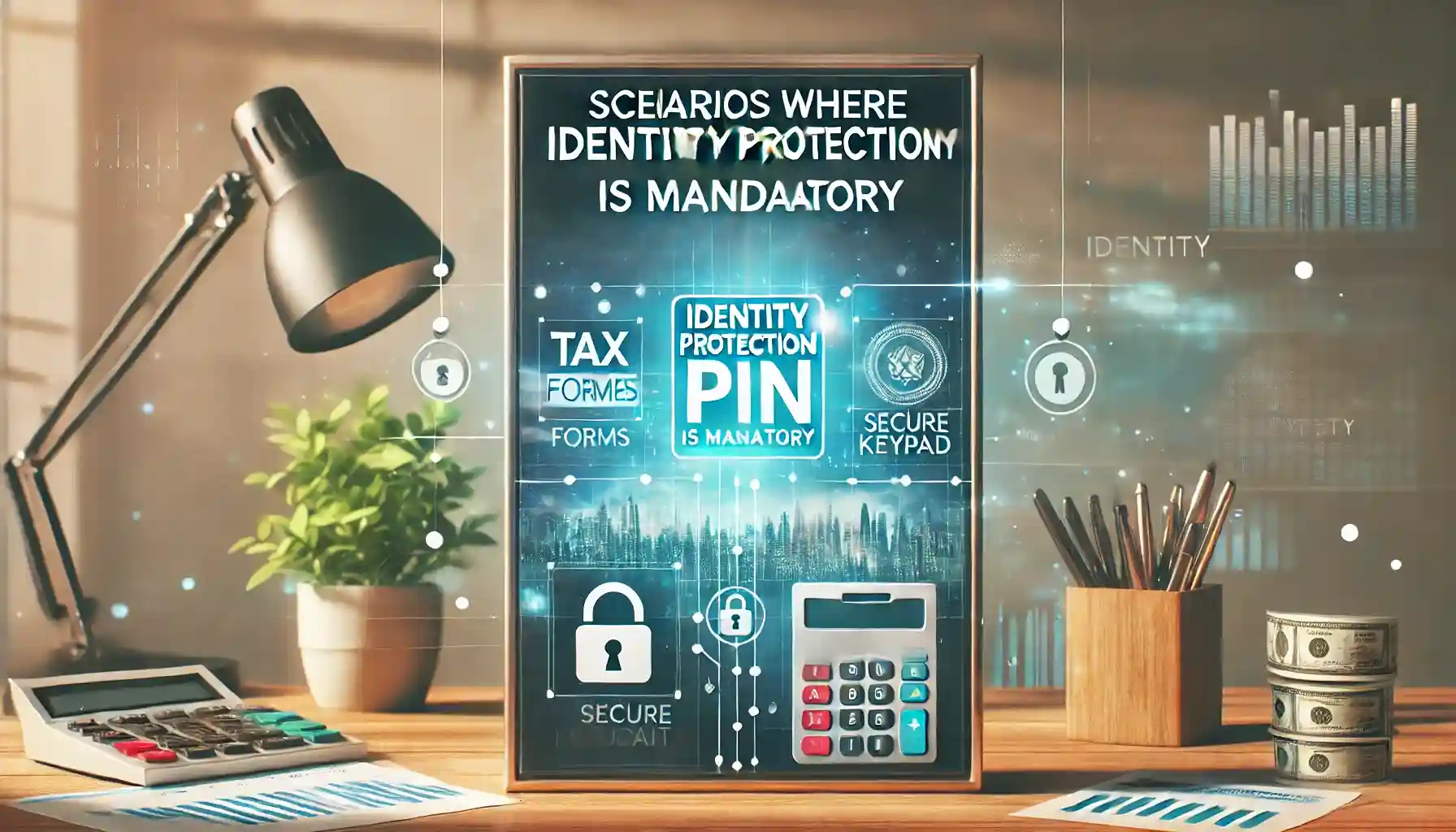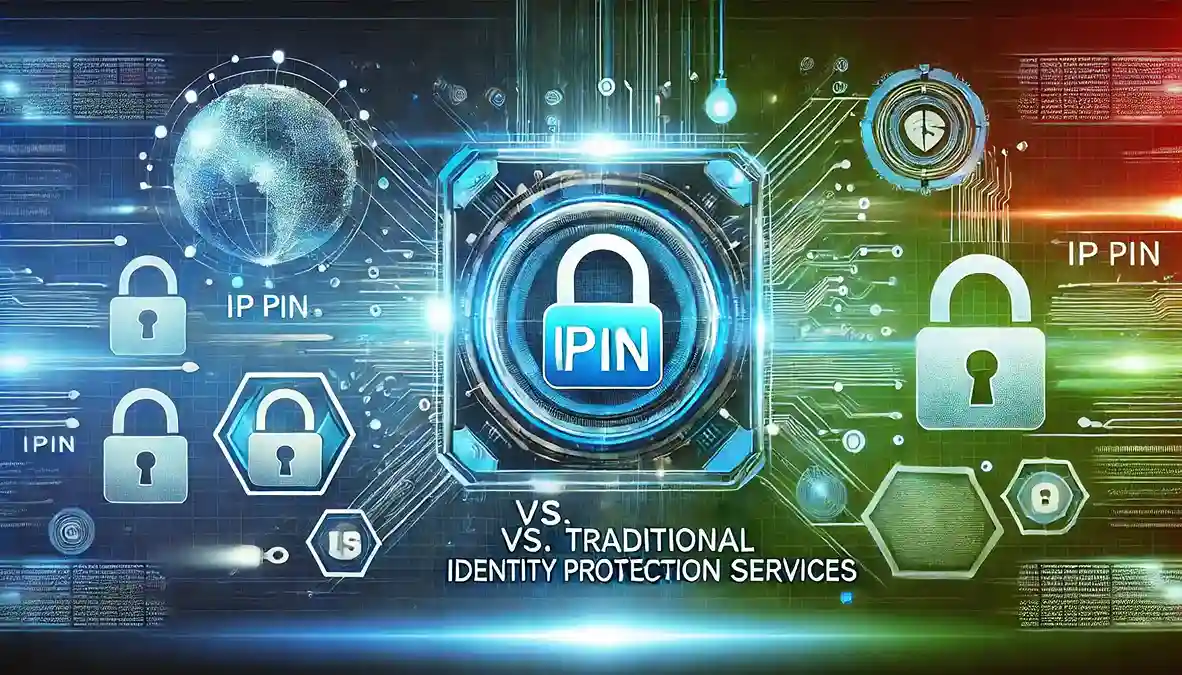Identity Protection PIN (IP PIN)
An Identity Protection PIN (IP PIN) is a six-digit number issued by the IRS (Internal Revenue Service) that helps protect taxpayers from identity theft and tax-related fraud. This unique PIN is specifically designed to safeguard taxpayers’ Social Security Numbers (SSNs) from unauthorized use, ensuring that only the legitimate taxpayer can file tax returns under their identity Identity Protection PIN.
Overview of the IP PIN
The Identity Protection Pin is a critical security feature that enhances the protection of your sensitive tax-related data. It acts as an extra layer of defence to prevent criminals from filing fraudulent tax returns in your name. The IRS assigns this six-digit PIN annually to eligible taxpayers, and it must be entered on your tax return to verify your identity. Without the correct IP PIN, the IRS will reject any return, blocking attempts at tax fraud.
Why the IRS Introduced IP PIN
The IRS introduced the IP PIN program in response to the increasing incidents of tax-related identity theft. Cybercriminals often exploit stolen personal information such as Social Security Numbers to file fraudulent tax returns and claim refunds. The growing sophistication of these attacks led the IRS to develop the Identity Protection PIN program to provide taxpayers with a robust tool to protect their identities. By requiring this additional identifier, the IRS can verify that the tax return comes from the rightful owner’s Identity Protection PIN.
How IP PIN Differs from Other PINs
Unlike other personal identification numbers, such as ATM PINs or security PINs for credit cards, the IP PIN is exclusively used for tax-related purposes. While other PINs safeguard financial transactions, the IP PIN is solely intended to protect taxpayers from fraudulent tax returns. The key difference lies in the fact that the Identity Protection PIN is assigned by the IRS and renewed each year to maintain security, unlike static PINs used in other contexts.
IP PIN’s Importance for Taxpayers
For taxpayers who have experienced or are at high risk of identity theft, the IP PIN is essential in protecting their tax identity. By using an IP PIN, taxpayers can prevent fraudsters from hijacking their tax returns and refund claims. It’s an effective tool in mitigating financial damage and preventing delays caused by fraudulent filings. Moreover, the Identity Protection PIN helps taxpayers regain control over their financial records and provides peace of mind during the tax season.
How to Obtain an Identity Protection Pin
Obtaining an IP PIN is a straightforward process, but it requires taxpayers to meet certain criteria and follow specific steps. Whether you are a victim of identity theft or want to take preventive measures, the IRS offers multiple ways to get an Identity Protection PIN and safeguard your tax identity.
IRS IP PIN Enrollment Program
The IRS has expanded the IP PIN enrollment program to include all taxpayers who wish to protect their tax identity, not just those who have experienced identity theft. This initiative is part of the IRS’s effort to bolster security and prevent tax fraud. The process is available through an online tool on the IRS website or through paper applications for those who qualify.
Eligibility Criteria
While the Identity Protection PIN program was originally limited to victims of tax-related identity theft, it is now available to all taxpayers. The key eligibility criteria include:
- Any taxpayer who wishes to voluntarily protect their identity by using an Identity ProtectionPIN can apply.
- Individuals who have experienced identity theft or tax fraud are encouraged to apply for an Identity ProtectionPIN.
- Taxpayers who live in areas with high levels of tax-related identity theft may be specifically targeted by the IRS to enrol.
In some cases, the IRS will assign an IP PIN automatically to those who have been victims of identity theft in previous tax years.
Common Issues Faced During Enrollment
Some taxpayers may face challenges during the enrollment process for obtaining an Identity Protection PIN, including:
- Verification Issues: If you cannot verify your identity online due to missing information or inaccurate details, your application may be delayed or denied. Make sure you have all the required documents ready before beginning the process.
- Technical Problems: The IRS online tool may occasionally experience high traffic or technical errors, which can cause delays in the application process. Consider applying during off-peak hours or trying again later if you encounter problems.
- Lost or Forgotten IP PINs: If you lose your IP PIN or forget it, you must retrieve it through the IRS website or by contacting the IRS directly for assistance.
Who Needs an IP PIN and Why?
An Identity Protection PIN (IP PIN) is essential for taxpayers who are at risk of identity theft or those who have experienced tax-related fraud. As identity theft becomes more sophisticated, protecting your financial and personal information is crucial. Let’s explore why taxpayers need an IP PIN and how it can protect them from potential fraud.
Identity Theft Risks for Taxpayers
Tax-related identity theft occurs when a malicious individual gains access to your personal information, such as your Social Security Number (SSN), and files a fraudulent tax return to claim refunds in your name. This can result in:
- Delayed Tax Refunds: If a criminal files a false tax return using your information, it could significantly delay your ability to file your legitimate tax return and receive your refund.
- Fines and Penalties: In some cases, victims of identity theft may face challenges clearing their names, leading to potential penalties or fines from the IRS.
- Damaged Credit Score: Tax fraud and the misuse of your personal information may affect your credit score, making it harder to apply for credit cards, loans, or mortgages.
Individuals Who Must Use IP PIN
The IRS requires certain individuals to use an IP PIN to protect their identity, such as:
- Victims of Identity Theft: If you have previously been a victim of tax-related identity theft, the IRS may automatically issue you an IP PIN to prevent future fraud.
- High-Risk Individuals: Taxpayers living in regions with a high incidence of tax fraud or those flagged as high-risk individuals by the IRS may be encouraged to use an IP PIN.
- Voluntary Participants: Anyone can apply for an IP PIN to add an extra layer of protection, even if they haven’t been victims of identity theft. The IRS allows voluntary enrollment to ensure everyone has access to this safety measure.
How IP PIN Protects You from Fraud
The IP PIN acts as a barrier between your personal information and cybercriminals. Here’s how it works:
- Unique Identifier: The IP PIN is a unique, six-digit number assigned specifically to you, which must be entered when filing your tax return.
- Annual Rotation: To further enhance security, the IP PIN changes every year. Even if someone gets access to your previous year’s IP PIN, they won’t be able to file a fraudulent return the following year.
- Verification Step: When you file your tax return, the IRS uses the IP PIN to verify your identity, ensuring that only you can submit a return under your SSN.
Scenarios Where Identity Protection PIN is Mandatory

While any taxpayer can apply for an IP PIN, there are specific scenarios where using an IP PIN is mandatory:
- IRS Assignment: If the IRS detects potential fraud on your account, they may require you to use an IP PIN.
- Identity Theft Victims: Those who have previously experienced tax fraud or identity theft are typically assigned an Identity Protection PIN by the IRS for future tax filings.
- Specific Geographic Locations: In some high-risk areas, the IRS may require residents to use an IP PIN due to the prevalence of tax-related identity theft.
How to Use Your IP PIN When Filing Taxes
Once you’ve received your IP PIN, using it correctly during tax season is essential. This additional security step helps protect your return and personal information. Let’s explore how to use your IP PIN when filing your taxes and what happens if you forget it or omit it from your return.
Consequences of Not Including IP PIN
Failing to include your IP PIN on your tax return can result in several consequences:
- Return Rejection: The IRS will reject your tax return if it doesn’t include the correct Identity Protection PIN, preventing the processing of your tax filing.
- Delays in Processing: If your return is rejected due to a missing or incorrect Identity Protection PIN, you’ll need to correct the issue and resubmit it, potentially delaying your tax refund.
Retrieving Lost or Forgotten IP PIN
If you lose or forget your IP PIN, don’t panic. There are ways to retrieve it:
- IRS Online Tool: The IRS provides an online tool called “Get an IP PIN” that allows you to retrieve your lost or forgotten Identity Protection PIN after verifying your identity.
- By Mail: In some cases, the IRS may mail you a new IP PIN. This is especially true for victims of identity theft who automatically receive a new IP PIN annually.
IP PIN Use for E-filing vs. Paper Filing
The process of using your IP PIN may vary slightly depending on how you file your taxes:
- E-filing: Most tax software will automatically prompt you to enter your IP PIN during the filing process. Make sure you input the correct PIN to avoid any issues.
- Paper Filing: For those filing taxes by mail, you’ll need to manually write your IP PIN on the IRS Form 1040 or other relevant forms. Ensure it is legible and accurate to avoid delays.
How to Protect Your IP PIN
While the IP PIN serves as an important security measure, it’s equally important to protect it from theft or misuse. Safeguarding your Identity Protection PIN ensures that your tax returns remain secure and that fraudsters cannot exploit your personal information.
Safeguarding Your IP PIN
- Store It Securely: Keep your IP PIN in a safe place, such as a password manager, where only you can access it.
- Do Not Share: Avoid sharing your IP PIN with anyone. Even tax preparers should only be given your Identity Protection PIN when absolutely necessary.
- Monitor Your Account: Regularly check your IRS account to ensure no suspicious activity is associated with your Identity Protection PIN.
What to Do If Your IP PIN is Stolen
If you suspect that your IP PIN has been stolen or compromised:
- Contact the IRS Immediately: Report the theft to the IRS so they can take steps to secure your account and issue you a new IP PIN.
- File a Report: You may also need to file a report with the Federal Trade Commission (FTC) to document the theft.
- Watch for Suspicious Activity: Monitor your financial accounts and credit reports for any signs of fraudulent activity.
IP PIN and Data Breaches

In the event of a data breach involving your IP PIN:
- Request a New IP PIN: Contact the IRS to request a new Identity Protection PIN as soon as possible. The IRS can issue a new number to ensure your personal information remains secure.
- Monitor Your Credit: Following a data breach, it’s important to monitor your credit reports and financial statements for any signs of fraudulent activity.
Keeping Your IRS Account Secure
Beyond protecting your IP PIN, it’s important to secure your IRS account:
- Use Strong Passwords: When creating an IRS account, use a strong password that is difficult to guess. Avoid using easily accessible personal information.
- Enable Two-Factor Authentication: The IRS offers two-factor authentication (2FA) for online accounts.
- Update Account Information Regularly: Keep your IRS account information up to date to ensure that any communications or updates reach you promptly.
What Happens if Your IP PIN is Compromised?
Even though an IP PIN offers a strong layer of protection against tax-related identity theft, it is still susceptible to misuse if it falls into the wrong hands. In case your IP PIN is compromised, there are specific steps you must take to mitigate the damage and regain control of your tax identity.
Recognizing IP PIN Fraud
- Unexpected IRS Notices: Receiving IRS notices about tax filings you did not make is a strong indication that your Identity Protection PIN has been compromised.
- Delayed Refunds: If your legitimate tax return is delayed or rejected because a return was already filed under your SSN, it could mean that your IP PIN was misused.
- IRS Account Access Issues: If you’re unable to access your IRS account or receive an error when trying to file your tax return, this could signal fraudulent activity.
Reporting Stolen or Misused IP PIN
- File an Identity Theft Affidavit (Form 14039): If your Identity Protection PIN has been used to file a fraudulent tax return, you may need to file Form 14039 with the IRS to begin the investigation and resolution process.
- Monitor Your IRS Notices: The IRS will keep you updated on the status of your case and any actions taken to secure your tax identity.
IRS Assistance in IP PIN Recovery
- Issuing a New IP PIN: The IRS can issue a new Identity Protection PIN to you for future filings, ensuring that the compromised PIN is no longer valid.
- Clearing Fraudulent Filings: The IRS will work with you to clear any fraudulent tax returns filed using your compromised IP PIN, helping to restore your legitimate tax records.
- Providing Ongoing Support: The IRS may offer continued monitoring and protection through its Identity Protection services to prevent future fraud.
Legal Steps if Your IP PIN is Compromised
- Report to the FTC: File an identity theft report with the Federal Trade Commission (FTC) to document the incident and get guidance on next steps.
- Notify Credit Bureaus: Place a fraud alert or credit freeze with the major credit bureaus (Equifax, Experian, and TransUnion) to protect your financial identity.
- Consult a Legal Professional: In severe cases of fraud, consulting an attorney specializing in identity theft can help you navigate the legal processes involved.
Annual Changes in Identity Protection PIN: What You Need to Know
The IRS updates taxpayers’ IP PINs yearly as part of its security protocols. Understanding how this annual change works ensures a smooth and secure tax-filing experience.
Why IP PIN Changes Every Year
By rotating the PIN every year, the IRS ensures that even if someone can steal your Identity Protection PIN, they can only use it for one tax season. This annual update helps protect your personal information from being reused by identity thieves.
Receiving New Identity Protection PIN Notification
You will typically receive your new Identity Protection PIN in the following ways:
- Online Retrieval: If you’ve enrolled in the IRS online account system, you can access your new IP PIN each year by logging in.
- By Mail: The IRS will mail your new Identity Protection PIN if you’ve opted out of online retrieval or do not have access to the internet. This mail typically arrives in December or early January.
Ensure that your mailing address is up to date to avoid delays in receiving your new Identity Protection PIN.
Updating Personal Information with IRS
To ensure that your IP PIN reaches you each year, it’s crucial to keep your personal information updated with the IRS. This includes:
- Updating Address: If you’ve moved, submit IRS Form 8822 to update your address.
- Correcting Errors: If any of your personal information (such as name or SSN) is incorrect in IRS records, promptly inform them to avoid complications with your IP PIN.
Impact of Annual Changes on Your Tax Filing
The annual change of your IP PIN does not affect the tax-filing process significantly, but here are a few things to keep in mind:
- Use the Most Recent IP PIN: Ensure that you use the correct, updated Identity Protection PIN for the current tax year.
- Timing: The annual change occurs before the tax filing season begins, so you will have your new Identity Protection PIN well in advance of the filing deadlines.
IP PIN vs. Traditional Identity Protection Services

While the IP PIN is a powerful tool for preventing tax-related identity theft, it’s important to understand how it compares to other identity protection services and what additional measures you can take to safeguard your personal information.
How IP PIN Differs from Identity Theft Protection Services
An IP PIN is designed specifically to protect your tax identity, while identity theft protection services offer broader coverage that includes monitoring credit reports, alerting you to suspicious activity, and offering assistance in case of fraud. Key differences include:
- Tax-Focused Protection: The IP PIN only protects your tax-related identity, ensuring that only you can file returns under your SSN.
- Broader Protection with Theft Services: Identity theft protection services monitor a wider range of personal information, such as credit cards, bank accounts, and loans.
Additional Tools for Identity Theft Prevention
In addition to using an Identity Protection PIN, consider using these tools to prevent identity theft:
- Credit Monitoring: Regularly check your credit report for suspicious activity or unauthorized accounts.
- Identity Theft Insurance: Some services offer insurance to cover the costs of recovering from identity theft.
Using IP PIN Alongside Other Security Measures
For maximum protection, it’s best to use your IP PIN in conjunction with other security measures:
- Secure Financial Transactions: Use strong, unique passwords for your financial accounts and never share sensitive information over unsecured networks.
- Monitor Your IRS Account: Keep an eye on your IRS account for any signs of unauthorized activity.
- Fraud Alerts: Place fraud alerts on your credit report if you suspect any suspicious activity.
Pros and Cons of Relying Solely on IP PIN
While the IP PIN offers strong protection against tax fraud, there are pros and cons to relying on it exclusively:
- Pros:
- Strong defence against tax identity theft.
- Automatically issued by the IRS to eligible taxpayers.
- Cons:
- Limited to tax-related identity protection.
- Do not monitor other financial activities such as credit card fraud or bank account misuse.
- Requires annual renewal, which can be inconvenient for some taxpayers.
IP PIN for Businesses: Is It Necessary?
While the Identity Protection PIN (IP PIN) is primarily designed for individual taxpayers, business owners may wonder if it’s necessary or applicable to their businesses. Protecting a business from fraud, especially tax-related identity theft, is as critical as securing personal information. However, the process and requirements for businesses differ from those for individuals.
Can Businesses Apply for IP PIN?
The IP PIN is specifically designed to protect individual taxpayers from identity theft related to their Social Security Numbers (SSNs) and personal tax returns. Since businesses typically use Employer Identification Numbers (EINs) rather than SSNs for filing taxes, the IP PIN program does not extend to business tax returns.
However, business owners who file personal taxes as sole proprietors may still benefit from applying for an Identity Protection PIN for their individual tax filings. If a business owner’s personal identity is compromised, it can potentially impact their business-related filings and financial records, making the IP PIN a useful tool for sole proprietors.
IRS Requirements for Business Owners
While businesses cannot apply for an Identity Protection PIN, the IRS has certain requirements and guidelines for business owners to protect their tax identities:
- Employer Identification Number (EIN): Every business must have an EIN, which functions like a Social Security Number for businesses. This number is used for tax filings, employee documentation, and other official purposes.
- Monitoring Business Accounts: The IRS encourages business owners to regularly monitor their tax filings and IRS accounts for any signs of fraud or unauthorized activity.
- Compliance with IRS Security Measures: Business owners should ensure they comply with IRS security protocols, including keeping their EIN confidential and using secure methods for filing tax documents.
Alternatives for Business Identity Protection
Even though businesses cannot use an IP PIN, there are several alternative methods available to protect a business from identity theft:
- EIN Protection: Just as individuals need to protect their SSNs, businesses should guard their EINs. Limit who has access to your EIN and store it securely.
- Third-Party Identity Protection Services: Many companies offer business identity theft protection services that monitor EINs, business credit reports, and other financial data for suspicious activity.
- Business Credit Monitoring: Regularly check your business credit report for any signs of fraudulent accounts or unauthorized activities.
Securing Business Information Beyond IP PIN
Businesses must take proactive steps to secure their financial and tax-related information. In addition to protecting EINs and using credit monitoring services, consider these security measures:
- Internal Security Protocols: Implement strong cybersecurity policies within your company, including secure passwords, encryption for sensitive data, and limited access to financial information.
- Employee Education: Ensure your employees understand the risks of identity theft and fraud, and provide training on best practices for protecting sensitive business data.
- Regular Financial Audits: Conduct regular audits of your financial and tax records to identify any inconsistencies or red flags that could indicate identity theft.
Future of IP PIN and Identity Protection

The IRS continues to enhance its fraud prevention systems, including improvements to the Identity Protection PIN program and other identity protection measures. As technology evolves, the future of identity protection is likely to be shaped by innovations and solutions aimed at safeguarding taxpayer information.
IRS Advancements in Fraud Prevention
The IRS has been making significant strides in fraud prevention, particularly through the IP PIN program. Key advancements include:
- Expanded Access to IP PINs: Initially, the Identity Protection PIN program was only available to identity theft victims. However, in recent years, the IRS has expanded the program to allow all taxpayers to voluntarily opt-in, giving more people access to this additional layer of protection.
- Improved Detection Algorithms: The IRS has developed more advanced algorithms and monitoring systems to detect suspicious tax filings and prevent fraud before it occurs.
- Collaboration with Law Enforcement: The IRS works closely with law enforcement agencies and financial institutions to share information on identity theft trends and identify fraud patterns.
Will IP PIN Be Mandatory for All Taxpayers?
As of now, the IP PIN program remains voluntary, though it is mandatory for individuals who have previously been victims of identity theft. However, there is growing speculation that the IRS may make the IP PIN mandatory for all taxpayers in the future as a standard fraud prevention measure.
Making the IP PIN mandatory could help the IRS better secure all taxpayers’ identities and reduce the risk of tax-related fraud on a national scale. However, implementing a universal Identity Protection PIN system would require the IRS to overcome logistical challenges, such as ensuring that every taxpayer has access to the necessary resources and that the system remains user-friendly.
Future Innovations in Identity Protection
As identity theft continues to evolve, future innovations in identity protection will likely focus on enhancing security through technology:
- Biometric Authentication: As more organizations adopt biometric security measures, such as fingerprint or facial recognition, the IRS may incorporate biometric authentication into the tax filing process to ensure only the correct individual can file a return.
- Blockchain for Identity Security: Blockchain technology offers the potential to securely store and verify personal information without the risk of data tampering. The IRS may explore blockchain-based systems to further safeguard taxpayer identities.
- Real-Time Fraud Detection: As artificial intelligence (AI) systems become more sophisticated, they could be used to detect fraudulent activity in real time, enabling the IRS to stop fraudulent tax returns before they are processed.
How AI and Technology Will Impact Identity Security
AI and emerging technologies are expected to play a pivotal role in the future of identity protection. Here’s how:
- Advanced Fraud Detection: AI-driven algorithms can analyze massive amounts of data quickly, identifying patterns and anomalies that could indicate identity theft. This real-time monitoring will allow the IRS to flag potential fraud before it becomes a serious issue.
- Enhanced User Experience: AI-powered virtual assistants and chatbots could be integrated into IRS systems to assist taxpayers in navigating the Identity Protection PIN application process, retrieving lost IP PINs, and understanding how to secure their personal information.
- Predictive Analytics: By leveraging predictive analytics, the IRS could proactively identify taxpayers who are at higher risk of identity theft and recommend additional security measures, such as early issuance of IP PINs or increased monitoring of their accounts.
Conclusion
The Identity Protection PIN (IP PIN) is an essential tool for safeguarding your tax identity from fraudsters. It is especially crucial for victims of identity theft, individuals in high-risk areas, and those who wish to take extra precautions when filing taxes. By understanding how to obtain, use, and protect your Identity Protection PIN, as well as recognizing the annual changes involved, you can better secure your personal information and prevent tax-related fraud. However, using the IP PIN alongside other identity protection services will provide a more comprehensive defence against potential identity theft across all areas of your financial life.
FAQs
Q1: What is an IP PIN?
An IP PIN is a six-digit number issued by the IRS to prevent tax-related identity theft.
Q2: Who needs an IP PIN?
Anyone can apply for an IP PIN, but it is mandatory for victims of tax-related identity theft and some high-risk individuals.
Q3: How can I get an IP PIN?
You can obtain an Identity Protection PIN by using the IRS’s online tool or applying via mail if you qualify.
Q4: Can I retrieve my IP PIN if I lose it?
Yes, the IRS provides options to retrieve lost Identity Protection PINs through their online tool or by contacting them directly.
Q5: How does the IP PIN differ from other identity protection services?
The IP PIN specifically protects your tax identity, whereas other services provide broader coverage for financial accounts and credit monitoring.
